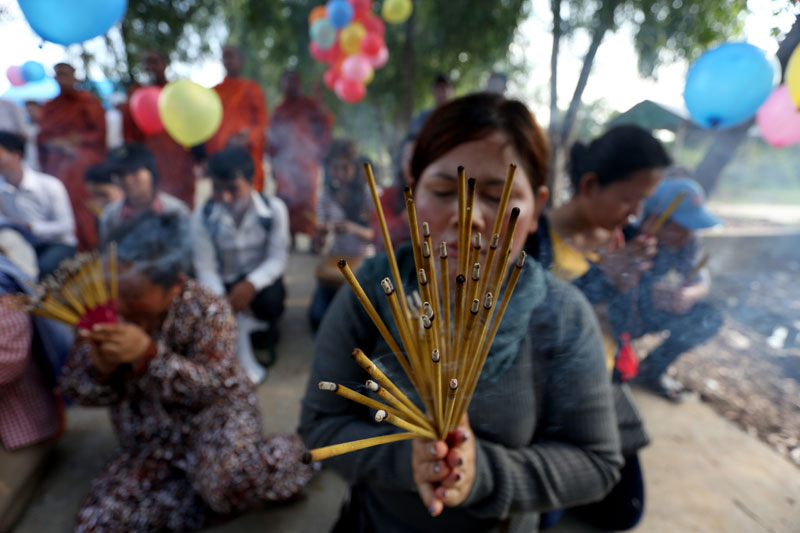SAMBO MEAS VILLAGE, Kompong Speu province – As military police with AK-47s descended on protesting garment workers during their nationwide strike on January 3, Sam Ravy, a manager at one of the many factories along Phnom Penh’s Veng Sreng Street, was on the phone with his mother-in-law.
Sam Ravy, who spoke Chinese and English as well as Khmer, earned double the $160 basic monthly salary being demanded by the strikers, but he attended the protest in Pur Senchey district to show solidarity with his workers.

“He had called and said ‘Hello mother, is my wife on the way to Phnom Penh with our child?’ I heard the sound of shooting, and I asked him where he was,” his mother-in-law, Long Saran, recalled Wednesday. She said Sam Ravy had dismissed her concerns in their morning phone call.
“He told me he was with the other protesters. Then his phone went quiet…. At 2 p.m. someone called us and told us to pick up the body,” she said.
Sam Ravy, 25, was one of at least five protesters killed by the military police’s AK-47 fire during the successful effort to put down the nationwide strike, which had dovetailed with mass protests by the political opposition.
On Friday, 13 of the strikers who were beaten and arrested during the protest on Veng Sreng will appear alongside 12 others before the Phnom Penh Municipal Court on charges of intentional destruction of property under aggravating circumstances.
Their property damage trial, which comes after almost four months of secretive incarceration in a notorious high-security prison on the Vietnamese border in Kompong Cham province, will be the government’s first substantial effort to take action over January 3.
“We are still waiting for the Ministry of Interior to contact us to provide answers about the killing, said Chhiv Phanith, Sam Ravy’s widow, at her mother’s home Wednesday.
Ms. Phanith met Sam Ravy while working under him in 2008 and married him two years later. After his death, she returned home to Kompong Speu so her mother could help raise her three-year-old son and daughter, who has yet to celebrate her first birthday.
She said the reluctance of authorities to show any interest in the shooting death of Sam Ravy had been evident since the day he was killed.
“They left my husband’s body alone and made the accusation that he was shot while stealing a motorbike,” she said.
On the evening of January 3, she arrived at a local pagoda and was presented with her husband’s body, still wearing his headband calling for a $160 monthly salary. “They said it was a dead dog’s body, and I was very shocked,” Ms. Phanith said.
Local authorities then demurred for months to even provide her with a death certificate for her husband, openly accusing her of being a supporter of the opposition, she said.
Multiple requests for an investigation into her husband’s death have resulted in little more than an unexplained payout of $2,500 from district authorities in Phnom Penh.
“We do not believe Cambodian authorities or courts will find justice for the people killed, injured or imprisoned,” Ms. Phanith said, dismissing the dormant government body created to “study” what happened on Veng Sreng Street on January 3.
“But they must bear the responsibility.”
At the Vattanac Industrial Park in Phnom Penh, Chhiv Sarun, 25, the widow of Yean Rithy, 25, who died in surgery from a bullet wound to the stomach, said her efforts to get answers from the government over her husband’s death had also yielded nothing.
Ms. Sarun said that authorities simply “do not care” about her husband’s death, pointing to the fact that she was prevented from visiting her husband as he lay dying in the hospital, and to the outright denials from the government that military police killed anyone.
“We have not heard from any of the authorities since the killing,” Ms. Sarun said, recounting vain efforts with local rights groups to secure an inquiry.
Ms. Sarun compared the government’s competence in arresting, incarcerating and trying the 13 protesters arrested on January 3 to the languishing investigations of the killings.
“It seems impossible to imagine those perpetrators in court,” Ms. Sarun said of the military police who shot and killed her husband.
In Kompong Speu, Ms. Phanith questioned the priorities of the government.
“They need to find out why people were killed and not just investigate property damage. Those people killed had wives and children who were waiting for them,” she said.
“The property damage can be repaired but the people can’t be brought back to life.”